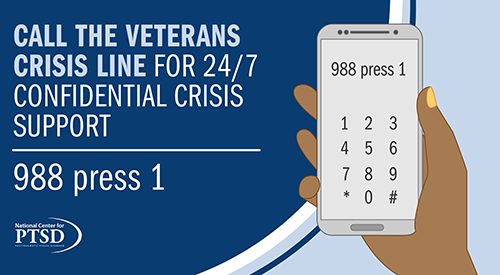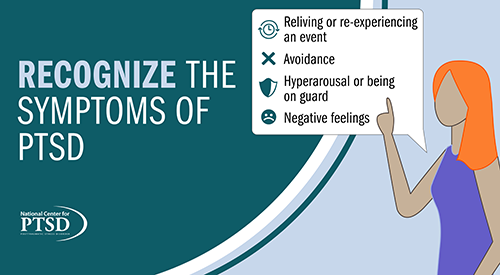- PTSD
- PTSD Home
- Understand PTSD
- Understand PTSD Treatment
- Get Help
- For Families and Friends
- For Providers
- Apps, Videos and More
- Article Database: PTSDpubs
- Clinical Trials Database
- Our Publications
- En Español
- About Us
- More Health Care
- Veterans Health Administration
- Health Benefits
- Conditions & Treatments
- Wellness Programs
- Locations
- Research
- Special Groups
- Careers, Job Help & Training
- About VHA


New Number, Same Support
The Veterans Crisis Line has a new number: 988 (press 1). Just dial 988 to reach 24/7 confidential crisis support for Veterans and their loved ones.

Know the Signs
If you’ve experienced a trauma, avoiding things that remind you of the traumatic event may be a sign of PTSD. Learn to recognize the symptoms.

We are the world's leading research and educational center of excellence on PTSD and traumatic stress.
PTSD is a mental health problem that some people develop after experiencing or witnessing a life-threatening event, like combat, a natural disaster, a car accident, or sexual assault. It's normal to have upsetting memories, feel on edge, or have trouble sleeping after this type of event. If symptoms last more than a few months, it may be PTSD. The good news is that there are effective treatments.
Treatment Options
Read about talk therapies & medications proven to help people with PTSD.
For Family & Friends
Help your loved ones with PTSD and find the support you need for yourself.
Are you treating Veterans with PTSD?
Ask our experts a question or request consultation about PTSD-related issues.

PTSD Information Voice Mail: (802) 296-6300
Email: [email protected]
Also see: VA Mental Health
U.S. Department of Veterans Affairs | 810 Vermont Avenue, NW Washington DC 20420
Last updated August 1, 2022


























